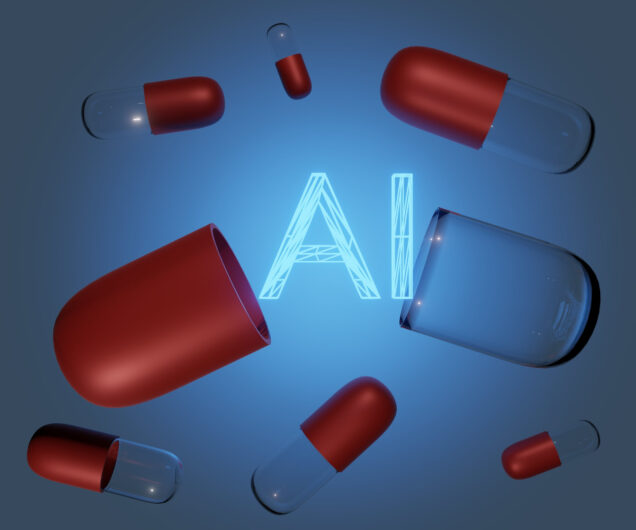From Lab to Market:
Exploring the Role of AI in Accelerating Drug Development and Production
Artificial intelligence (AI) is revolutionizing the field of pharmaceuticals, transforming the way drugs are developed and produced. In the past, bringing a new drug to market was a lengthy and costly process, often taking years and billions of dollars. However, with the advent of AI, this process is being accelerated and streamlined.
From lab to market, AI is playing a crucial role at every stage of drug development. It can analyze vast amounts of data to identify potential drug candidates, saving scientists precious time in the initial research phase. AI algorithms can also predict the properties and behavior of these compounds, helping researchers select the most promising candidates for further testing.
Additionally, AI-powered robotics and automation are optimizing drug production, improving efficiency, and reducing errors. By leveraging AI, pharmaceutical companies can speed up the manufacturing process while maintaining quality and safety standards.
By harnessing the power of AI, the pharmaceutical industry is poised to deliver breakthrough treatments faster than ever before. As technology continues to advance, the potential for AI to revolutionize drug development and production is limitless, promising better, more effective drugs for patients worldwide.
Benefits of using AI in drug development and production
AI offers numerous benefits in drug development and production. Firstly, it can analyze vast amounts of data to identify potential drug candidates, saving scientists precious time in the initial research phase. Traditionally, researchers would spend countless hours poring over scientific literature and conducting experiments to identify promising compounds. With AI, this process can be automated, allowing scientists to focus on more complex tasks.
Secondly, AI algorithms can predict the properties and behavior of these compounds, helping researchers select the most promising candidates for further testing. By analyzing molecular structures and past experimental data, AI can offer insights into the efficacy and safety of potential drug candidates. This not only saves time but also reduces the risk of selecting ineffective or unsafe compounds for further development.
Lastly, AI-powered robotics and automation are optimizing drug production, improving efficiency, and reducing errors. By leveraging AI, pharmaceutical companies can speed up the manufacturing process while maintaining quality and safety standards. AI can monitor and control various aspects of production, such as temperature, pressure, and mixing ratios, ensuring that each batch of drugs meets the required specifications.
In summary, AI in drug development and production offers benefits such as accelerated identification of potential drug candidates, prediction of compound properties, and optimization of manufacturing processes. These advantages have the potential to revolutionize the pharmaceutical industry and improve patient outcomes.
AI applications in drug discovery
AI has shown great promise in the field of drug discovery. By analyzing vast amounts of biological and chemical data, AI algorithms can identify patterns and relationships that may not be apparent to human researchers. This allows for a more comprehensive exploration of potential drug candidates.
One application of AI in drug discovery is virtual screening. Traditionally, scientists would conduct high-throughput screening of thousands of compounds to identify potential drug candidates. This process is time-consuming and expensive. AI algorithms can analyze chemical structures and predict their potential for binding to specific proteins or receptors, enabling researchers to narrow down the list of compounds to test.
AI can also assist in target identification and validation. By analyzing genetic and proteomic data, AI algorithms can identify potential drug targets that may be involved in disease pathways. This information can then be used to develop drugs that specifically target these pathways, increasing their effectiveness and reducing side effects.
In addition to these applications, AI can also help in lead optimization, toxicity prediction, and de novo drug design. These capabilities have the potential to significantly speed up the drug discovery process and reduce the cost of bringing new drugs to market.
AI applications in clinical trials
Clinical trials are an essential step in the drug development process, as they provide crucial data on the safety and efficacy of potential drugs. However, clinical trials are often time-consuming and expensive, with many trials failing to meet their objectives.
AI can help optimize and streamline the clinical trial process. By analyzing patient data, AI algorithms can identify suitable candidates for clinical trials, ensuring that the right patients are enrolled. This can help reduce the time and cost associated with patient recruitment.
AI can also assist in the design and monitoring of clinical trials. By analyzing data from previous trials, AI algorithms can identify patterns that may indicate the likelihood of success or failure. This information can be used to design more efficient trials, reducing the risk of trial failure and accelerating the development process.
Furthermore, AI can help in the analysis of clinical trial data. By analyzing patient outcomes and treatment responses, AI algorithms can identify patterns and correlations that may not be apparent to human researchers. This can provide valuable insights into the effectiveness and safety of potential drugs, helping researchers make more informed decisions.
By leveraging AI in clinical trials, pharmaceutical companies can reduce costs, improve patient recruitment and retention, and increase the chances of success.
AI applications in manufacturing and production
AI-powered robotics and automation are transforming drug manufacturing and production. By replacing manual processes with AI-driven systems, pharmaceutical companies can improve efficiency, reduce errors, and ensure consistent product quality.
One application of AI in manufacturing is process optimization. AI algorithms can analyze data from various stages of the manufacturing process to identify bottlenecks and inefficiencies. This information can then be used to optimize the process, reducing production time and costs.
AI can also assist in quality control and assurance. By analyzing data from sensors and monitoring systems, AI algorithms can detect deviations from the desired specifications and alert operators to potential issues. This can help prevent defective products from reaching the market and ensure that each batch of drugs meets the required quality standards.
Furthermore, AI can enable predictive maintenance of manufacturing equipment. By analyzing data from sensors and historical maintenance records, AI algorithms can predict when equipment is likely to fail and schedule maintenance proactively. This can help reduce unplanned downtime and improve overall equipment effectiveness.
In summary, AI in manufacturing and production offers benefits such as process optimization, quality control, and predictive maintenance. By leveraging AI-driven systems, pharmaceutical companies can improve efficiency, reduce errors, and ensure consistent product quality.
Challenges and limitations of AI in drug development and production
While AI offers numerous benefits in drug development and production, it also faces several challenges and limitations. One challenge is the availability and quality of data. AI algorithms require large amounts of high-quality data to learn and make accurate predictions. However, in the field of drug development, data availability can be limited, especially for rare diseases or novel compounds. Additionally, the quality of data can vary, with inconsistencies and errors that can affect the reliability of AI predictions.
Another challenge is the interpretability and explainability of AI algorithms. AI algorithms often work as black boxes, making predictions without providing clear explanations for their decisions. In the field of drug development, where safety and efficacy are paramount, it is crucial to understand the reasoning behind AI predictions. This lack of interpretability can make it difficult for regulators and researchers to trust and adopt AI-driven solutions.
Furthermore, the ethical considerations of AI in drug development and production need to be addressed. Issues such as data privacy, algorithmic bias, and the potential for AI to replace human workers need careful consideration. As AI continues to advance, it is essential to ensure that it is used responsibly and ethically in the pharmaceutical industry.
Despite these challenges and limitations, AI has the potential to revolutionize drug development and production. By addressing these issues and leveraging the power of AI, the pharmaceutical industry can accelerate the delivery of breakthrough treatments and improve patient outcomes.
Successful examples of AI in drug development and production
Several successful examples illustrate the impact of AI in drug development and production. One such example is the discovery of new drugs for rare diseases. Traditional drug discovery methods often struggle to identify effective treatments for rare diseases due to limited data and understanding. AI algorithms can analyze data from various sources, including scientific literature, genetic databases, and clinical trials, to identify potential drug candidates for rare diseases. This has the potential to provide hope for patients suffering from these conditions.
Another example is the use of AI in personalized medicine. By analyzing patient data, including genetic information, AI algorithms can identify biomarkers and genetic signatures that may indicate the likelihood of a positive response to a particular treatment. This allows for more targeted and personalized treatment strategies, improving patient outcomes and reducing the risk of adverse effects.
Additionally, AI has been successfully employed in optimizing the formulation and delivery of drugs. By analyzing data on drug solubility, stability, and release profiles, AI algorithms can suggest formulation modifications that improve bioavailability and efficacy. This can lead to more effective and patient-friendly drug formulations.
These examples highlight the potential of AI in driving innovation and improving outcomes in drug development and production. By leveraging AI-driven solutions, pharmaceutical companies can overcome traditional limitations and deliver better, more effective drugs to patients worldwide.
Future prospects and trends in AI for drug development and production
The future of AI in drug development and production looks promising, with several trends and advancements on the horizon. One trend is the integration of AI with other emerging technologies, such as genomics and nanotechnology. By combining AI with these technologies, researchers can gain deeper insights into disease mechanisms and develop more targeted and effective treatments.
Another trend is the use of AI in drug repurposing. Rather than starting from scratch, researchers can use AI algorithms to analyze existing drugs and identify potential novel uses. This can significantly reduce the time and cost associated with drug development, as the safety profiles of these drugs are already well-established.
Furthermore, the use of AI in real-time monitoring and adaptive clinical trials is gaining traction. By continuously analyzing patient data during clinical trials, AI algorithms can identify early indicators of treatment success or failure. This information can be used to modify treatment protocols, improve patient outcomes, and reduce trial costs.
Additionally, the democratization of AI tools and technologies is making AI more accessible to smaller pharmaceutical companies and research institutions. Cloud-based platforms and open-source software enable researchers to access and utilize AI algorithms without significant upfront costs. This democratization has the potential to drive innovation and accelerate the development of new drugs.
In summary, the future of AI in drug development and production is bright. Advancements in technology, the integration of AI with other emerging fields, and the democratization of AI tools are set to drive innovation and improve patient outcomes. As AI continues to evolve, its impact on the pharmaceutical industry is likely to be transformative.
Ethical considerations in AI-driven drug development and production
As AI becomes increasingly prevalent in drug development and production, ethical considerations must be taken into account. One ethical concern is data privacy and security. AI algorithms require access to large amounts of patient data to learn and make accurate predictions. It is essential to ensure that this data is collected and stored securely, with appropriate consent from patients. Additionally, steps should be taken to prevent the misuse or unauthorized access to this data.
Another ethical consideration is algorithmic bias. AI algorithms learn from historical data, which may contain biases and inequalities. If these biases are not addressed, AI algorithms can perpetuate and amplify existing biases, leading to unfair treatment or unequal access to healthcare. It is crucial to develop and implement strategies to detect and mitigate algorithmic bias in AI-driven drug development and production.
Furthermore, the potential for AI to replace human workers raises ethical concerns related to job displacement and socioeconomic inequalities. While AI has the potential to improve efficiency and reduce costs, it is essential to ensure that its deployment does not result in significant job losses or widen existing socioeconomic disparities. Measures such as retraining programs and labor market policies may be necessary to address these concerns.
Ethical considerations must be at the forefront of AI-driven drug development and production. Data privacy, algorithmic bias, and socioeconomic implications are just a few of the ethical challenges that need to be addressed. By proactively addressing these concerns, the pharmaceutical industry can harness the power of AI while ensuring that its benefits are realized ethically and equitably.




 Learn more
Learn more


